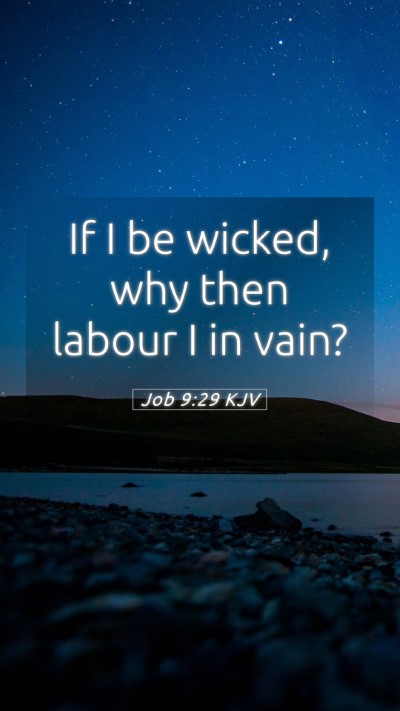Understanding Scripture: Job 9:29
This verse arises in a response that reflects Job's profound disillusionment with his circumstances. Despite being a righteous man, he feels overwhelmed by an unjust situation where the wicked seem to prosper.
Bible Verse Interpretations
- Matthew Henry's Commentary: Henry emphasizes Job's despair in expressing the notion that if he is indeed wicked, then his struggles are in vain. This highlights Job's belief in retributive justice, questioning the moral order of the universe.
- Albert Barnes' Notes: Barnes enhances this by noting that Job does not see the benefit of maintaining righteousness if it leads to suffering. He questions God's decisions and longs for an advocate.
- Adam Clarke's Commentary: Clarke dives into the philosophical aspect, suggesting that Job perceives his labor and integrity as meaningless in light of his suffering, leading to the human tendency to question divine justice.
Scripture Analysis
Job 9:29 delves deeply into human suffering and divine justice, resonating with anyone wrestling with the existence of pain in life. It opens a discourse on the suffering of the righteous and the fate of the wicked.
Biblical Exegesis and Context
Understanding this verse requires consideration of Job's entire narrative—he is a figure of integrity facing immense trials. The questions he raises are universal, touching on the human condition regarding suffering.
Application of the Verse
Job’s assertion speaks to our own experiences. Many feel despondent when facing adversity, particularly when trying to lead a moral life. This verse encourages readers to reflect on the nature of suffering, justice, and faith.
Bible Study Insights
- Consider the balance between faith and doubt when faced with hardships.
- Reflect on the nature of righteousness in the light of affliction.
- Engage with community or Bible study groups to gain insights from shared experiences around suffering and justice.
Related Bible Cross References
- Job 1:22: "In all this Job did not sin nor charge God with wrong." This verse establishes Job's righteousness prior to his suffering.
- Psalms 73:3-5: Addresses the prosperity of the wicked, echoing Job’s sentiments about the injustice he feels.
- Ecclesiastes 8:14: "There is a vanity which is done upon the earth; that there be just men, unto whom it happeneth according to the work of the wicked..." suggesting the seeming injustice of life.
Conclusion
Job 9:29 is a profound inquiry into the moral fabric of existence. As individuals seek bible verse meanings, bible verse interpretations, and bible study insights, this verse serves as an essential starting point for discussing the complexities of suffering and righteousness.


